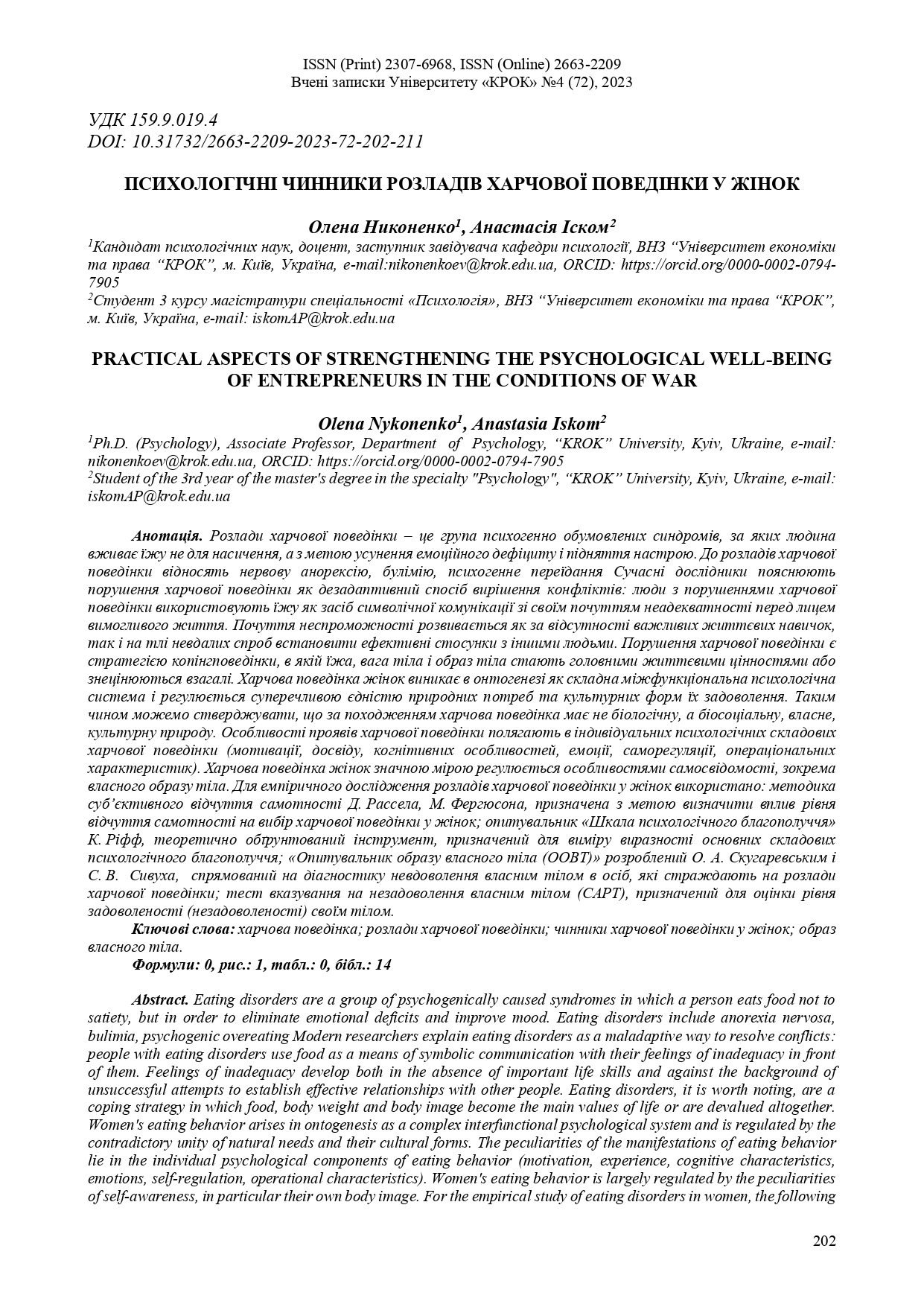PRACTICAL ASPECTS OF STRENGTHENING THE PSYCHOLOGICAL WELL-BEING OF ENTREPRENEURS IN THE CONDITIONS OF WAR
DOI:
https://doi.org/10.31732/2663-2209-2023-72-202-211Keywords:
eating behavior, eating disorders, factors of eating behavior in women, body imageAbstract
Eating disorders are a group of psychogenically caused syndromes in which a person eats food not to satiety, but in order to eliminate emotional deficits and improve mood. Eating disorders include anorexia nervosa, bulimia, psychogenic overeating Modern researchers explain eating disorders as a maladaptive way to resolve conflicts: people with eating disorders use food as a means of symbolic communication with their feelings of inadequacy in front of them. Feelings of inadequacy develop both in the absence of important life skills and against the background of unsuccessful attempts to establish effective relationships with other people. Eating disorders, it is worth noting, are a coping strategy in which food, body weight and body image become the main values of life or are devalued altogether. Women's eating behavior arises in ontogenesis as a complex interfunctional psychological system and is regulated by the contradictory unity of natural needs and their cultural forms. The peculiarities of the manifestations of eating behavior lie in the individual psychological components of eating behavior (motivation, experience, cognitive characteristics, emotions, self-regulation, operational characteristics). Women's eating behavior is largely regulated by the peculiarities of self-awareness, in particular their own body image. For the empirical study of eating disorders in women, the following methods were used: the method of subjective feeling of loneliness by D. Russell, M. Ferguson, designed to determine the influence of the level of loneliness on the choice of eating behavior in women; questionnaire "Psychological Well-Being Scale" by K. Riff, a theoretically based tool designed to measure the expressiveness of the main components of psychological well-being; "Body Image Questionnaire" developed by S. Skugarevsky S. V. Syvuha, aimed at diagnosing dissatisfaction with one's own body in persons suffering from eating disorders; the Body Dissatisfaction Test (BDT) is designed to assess the level of satisfaction (dissatisfaction) with one's body.
Downloads
References
Ваколюк, Л. М., Сокур, С. О., Секрет, Т. В. ( 2018) Ожиріння: профілактичні та медико-соціальні аспекти [Електронний ресурс]. Вісник Вінницького національного медичного університету. Т. 19. № 21. С 197–201. - Режим доступу: http://nbuv.gov.ua/UJRN/vvnmu_2018_19_1_54
Вольнова, Л. М. ( 2009) Профілактика девіантної поведінки особистості. Київ: НПУ ім. М. П. Драгманова. 224 с.
Зубар, Н. М. ( 2010) Основи фізіології та гігієни харчування. Київ: Центр учбової літератури, 336 с.
Іваненко, Л. М. ( 2018) Спосіб життя батьків як детермінанта здоров’я дітей. Педагогічні науки: теорія, історія, інноваційні технології. № 2. С. 411–421.
Ільницька, Т. (2018) Розлади харчової поведінки: міфи та факти. ТОВ «Медичний журнал «Нейроньюс». №4. С. 6-7.
Ковальова, Н. В. (2007) Нервова анорексія (клініка, діагностика, терапія): автореф. дис. ... канд. мед. наук : 14.01.16. Харків: Інститут неврології, психіатріі та наркології АМН України, 20 с.
Кокун, О.М. (2004) Оптимізація адаптаційних можливостей людини: психофізіологічний аспект забезпечення діяльності: Монографія. Київ: Міленіум, 265 с.
Ковальчук, З. Я. ( 2019) Психологічні аспекти порушення харчової поведінки у жінок. Інсайт: психологічні виміри суспільства. . Вип. 2. С. 91-99.
Коростій, В. І. ( 2013) Прогнозування та психотерапевтична корекція емоційних розладів при психосоматичних захворюваннях. Медична психологія. № 3. С. 56–62.
Кузьмінська, М. С., Червона, О. В. ( 2005) Значення раціонального харчування для підтримки здоров’я молоді. Кн. 4. Київ: Державний інститут проблем сім’ї та молоді, С. 13–22.
Никоненко, О. В. (2023) Особливості психологічного супроводу безробітних осіб в умовах війни. Підтримка психологічного здоров’я особистості в умовах війни: матеріали VI Всеукраїнських психологічних читань «Удосконалення професійної майстерності майбутніх психологів», 21 квітня 2023 р. ред. кол. : Андрусик О.О. та ін. Умань. 182 с.
Сингаївська, І. В., Бондаренко, А. М. ( 2022) Розлади харчової поведінки під час подій воєнного характеру. Держава, регіони, підприємництво: інформаційні, суспільно-правові, соціально-економічні аспекти розвитку: тези доповідей ІV Міжнародної конференції (7 грудня 2022 р., м. Київ). Київ: Університет "КРОК". https://conf.krok.edu.ua/SRE/SRE-2022/paper/view/1323
Шебанова, В. І. (2017) . Психологія харчової поведінки. Автореф. дис. доктора психол. наук. 19.00.01, Київський національний університет імені Тараса Шевченка. Київ, 40 с.
Ryff, C. D., Singer, B. H. (2008) Know thyself and become what you are: A eudaimonic approach to psychological well-being. Journal of Happiness Studies. Vol. 9(1). Pр. 13–39.

Downloads
Published
How to Cite
Issue
Section
License

This work is licensed under a Creative Commons Attribution-NonCommercial 4.0 International License.

